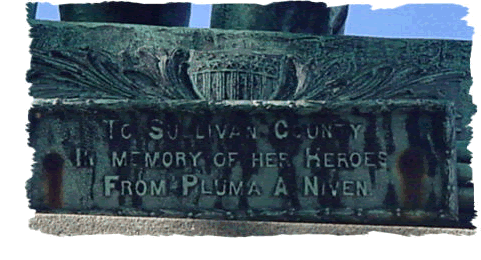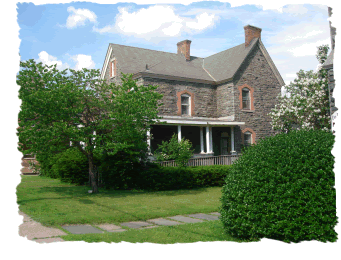
I became curious a while back upon discovering that the back of the base of the Soldier and Sailor Monument on the lawn of the Lawrence H. Cooke Sullivan County Court House (under the soldier's feet) an inscription says, "To Sullivan County in memory of her Heroes from Pluma A. Niven".
I wondered what this meant, in contrast to the larger inscriptions beneath that the monument was donated "1895, Erected by the Board of Supervisors of Sullivan County from the free offerings of the loyal citizens".
Who was Pluma A. Niven, I wondered, and why did she merit special note on the statue? These questions led to accounts of a "quarrel" between ladies of the association that was promoting and raising funds from contributors county-wide for the monument's construction.

The dispute grew so heated that in 1893 (two years before its formal unveiling) The New York Times predicted the monument project would fail. As a result of this, Monticello today has two separate and remarkably similar monuments instead of one. The other was originally situated at the corner of Broadway and Jefferson Street and was moved in the late 20th century to Joe's Park a few blocks east.
Pluma Niven was likely interested in honoring the Civil War dead at least in part to honor her own family's history of military service, up to and including her then still living brother Hobart.
Born to the union of Israel Phelps Tremain and Harriet Allen Tremain on February 10, 1843 in Monticello, Pluma A. Tremain Niven was the granddaughter of Levi Tremain on her father's side, and Samuel Seabury Allen and Harriet Flower on her mother's. Her maternal grandmother was the son of Governor Roswell P. Flower. Levi Tremain served as a member of the NYS Assembly, as did his father Lyman Tremain. Pluma's father, Israel P. Tremain, declined encouragement that he received to run for state public office, though he did serve as Supervisor of the Town of Thompson and as a Trustee of the Village of Monticello. Israel Tremain appears to have been a deeply spiritual man who devoted much of his life to building and serving St. John's Episcopal Church.
Reading about the above history led to other accounts involving Mrs. Niven, including her release in 1900 from the Middletown Psychiatric Hospital after her brother filed a habeas corpus writ in Orange County Court. "The troubles of her daughter so preyed on Mrs. Niven's mind that she suffered from acute melancholia, and about a month ago was committed to Middletown," the Times reported.
Jennie Niven (1867-1927) ![]() was the daughter of Thornton A. Niven (1841-1905)
was the daughter of Thornton A. Niven (1841-1905) ![]() and Pluma Tremaine Niven (1843-1912),
and Pluma Tremaine Niven (1843-1912), ![]() a granddaughter of Gen. Archibald Niven (1840-1896)
a granddaughter of Gen. Archibald Niven (1840-1896)![]() , and great-granddaughter of pioneers Daniel Niven (1766-1867) and Ann Niven (1780-1867)
, and great-granddaughter of pioneers Daniel Niven (1766-1867) and Ann Niven (1780-1867) ![]() .
.
Jennie is described as having been very beautiful. It is said many local men were drawn to her.
A longtime Monticello resident recently recalled her grandfather's description of the start of the affair: "According to my grandfather some neighborhood children playing hide and seek observed quite a sight one evening. From behind the bushes where they were hiding they observed Jennie disrobing in front of her bedroom window. Across the lawn at his window was the Rev. Howell, her single (or so she thought) and select audience. The children apparently told their parents about what they had observed and so some adults later were staked out to see what they could see and apparently did see this same show!"
Of course, the viability of this possibly apocryphal story depends on the quality of Rev. Howell's eyesight and whether the parish house may have been within sight of Jenny's window. Jenny's parents lived "at the present site of the Monticello Funeral Home, Inc." If this refers to the same building as the present VanInwegen-Kenny Funeral Home, the rectory may have been visible from certain windows, but the distance was great enough that it would have required the aid of a lens to make out many of Jenny's attributes.
If the "Monticello Funeral Home" existed in what is presently known as Garlick's Funeral Home (which seems more likely to me), the Niven home could not have been visible from the rectory on St. John Street. However, what is not clear whether Jenny was still living with her husband, Samuel Greene, and if so, precisely where their home was. In any case, the story of the affair between Jenny and the rector of St. John's is still talked about in this small village.
Before his liaison with Mrs. Greene, the Rev. Howell angered some in his flock by arbitrarily striking their names from the rolls at St. John's Church for not attending his sermons often enough. The gentle folk in question, who had apparently been staying away on Sunday mornings because of their feelings about the minister, sued -- once again in Orange County Court. The court dismissed the complaint in 1897, loath to involve itself in an ecclesiastical concern out of respect for the First Amendment.
Later the same year, however, the pastor was convicted of assault and battery for beating and choking his wife after an argument stemming from Mrs. Howell's feelings about his involvement with Jennie, as well as issues involving money and a proposed marital separation agreement.
"The trouble arose over a pet cat, which Mr. Howell was feeding in the dining room while he ate his dinner. Mrs. Howell ordered a domestic [a Miss Hattie Geraghty] to take the cat from the room. The animal refused to go and showed fight. Mrs. Howell then tried to drive it out, whereupon, she claims, Mr. Howell caught her by the throat and choked and beat her until she screamed for help," The New York Times reported on December 15, 1897.
After conviction, Rev. Howell was offered a choice between paying a fine of $3.00 or serving three days in Sullivan County Jail. He took the three days. Eight months later, Rev. Howell was removed from his station by Bishop Potter of New York City, though the bishop wrote him a letter urging him not to leave the ministry entirely. Meanwhile, Mrs. Howell sued Jennie for alienation of her husband's affection. Jennie was also sued by her husband, Samuel B. Greene of Brooklyn. Jennie did not contest his request for divorce.

After Rev. Howell left Monticello, he went to Newark and studied law with A.Q. Keasbey & Sons and was admitted to the bar. In July 1906, he was elected chairman of the Essex County Democratic Committee and served until August 1907, when he resigned. He was appointed a Judge in the First Criminal Court of Newark, by Mayor Haussling at the beginning of that mayor's term in January 1907. As a Judge, Howell was criticized for actions alleged to have been inspired by party affiliations, among them being the entertaining of complaints leading to the arrest of several prominent Newark officials for "conspiracy to indict" - an alleged criminal charge which was later ruled not to exist.
In 1908, Judge Howell committed suicide by shooting himself in the head, in Branch Brook Park in downtown Newark, after a so-called "mudslinging" opponent (the local under-sheriff) threatened to make public Howe's affair in Monticello.
Before entering the ministry, Howell was a successful contracting agent and had charge of handling the iron and copper work in the construction of the Statue of Liberty. The son of English parents, Howell was born and educated in Ireland. Before becoming a contractor, "he worked as a rent collector for Capt. James Boycott, whose name became immortalized by becoming synonymous with ostracizing by agreement," the Times noted. He went to New York in 1881, found employment on the construction of the Brooklyn Bridge, and was present for its opening.
Howell was a Mason, as was Jennie's husband, Samuel B. Greene, and members of the Niven family. According to the History of Freemasonry in Sullivan County and Monticello Lodge #532, F&AM, Howell affiliated with Monticello Lodge on May 28, 1897, and demitted on December 19, 1901, after he left town.
It does not seem Howe was ever charged with un-Masonic conduct including, for example, having illegal carnal intercourse with a Master Mason's wife -- not to mention the abusive behavior in his own home. Perhaps this is partly because he left the State of New York and tried to start fresh. In the report of his suicide, The New York Times noted: "He was a Free Mason and was a grand representative to the New Jersey Grand Council of the Royal Arcanum."
A few days later, the Times reported that Judge Howell's widow, Jennie T. Howell, was seriously ill at her home at 82 Peabody Street, Newark, under the constant care of a physician. "Police have been detailed to guard the house to prevent the patient being disturbed and to keep the many curious persons from gathering in front of the dwelling," the report said.
The article concluded: "A thorough search of Judge Howell's papers failed to reveal any document that would throw light on his act. Among his letters was one found from the late Bishop Henry C. Potter, which advised against Judge Howell's announced intention of giving up the ministry to study law. It was dated several years ago."
The published history of Monticello Lodge makes no mention of the controversies involving the Rev. Howell. The only mention of Greene in the history is a note in memoriam, recording his death on May 10, 1909. The news report of Howe's suicide also noted that three years after divorcing his wife, "Samuel Greene killed himself by a revolver shot in the Fifth Avenue Hotel, this city."
Jennie Niven's grandfather and great-grandfather, who were among the leading members of the earliest community at Monticello, were also members of the Masonic lodges here.
Sometime after Judge Howell's suicide, Jennie Lee Niven Greene Howell married her third and final husband, Louis A. Guimond. She died in 1927 at the age of 60 without children. Jennie Guimond![]() is buried at Rock Ridge Cemetery in Monticello beside her parents and paternal ancestors.
is buried at Rock Ridge Cemetery in Monticello beside her parents and paternal ancestors.
A decade after the above affair, the death of Lt. Hobart Tremain (mentioned in the first paragraph above as having petitioned for his sister Pluma to be released to his care from the psychiatric hospital) was reported when he fell from his second-story room in the Hotel St. Dennis located at Broadway and 11th Street in New York City. According to the account, "Lt. Tremain, who never married, made his home in Monticello with a sister [Pluma Tremain Niven], but spent much of his time in this city."
![]()
